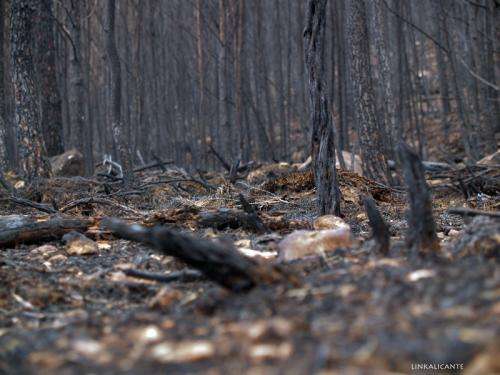Invasive Gramineae species propagate by wildfire in the Mediterranean and aid its spread

Researchers in the Biological Station of Doñana (CSIC) have studied the extent to which alien invasive plants benefit from fires in Mediterranean regions. Their results indicate that many grasses and certain trees are spread by wildfire, species which in turn increase the frequency of fires, as occurs with Eucalyptus trees in Portugal and Galicia.
Unlike other Mediterranean regions, there are few studies regarding the interaction of fire and invasive plant species in Spain. Researchers from the Biological Station of Doñana (CSIC) have analysed the scientific articles that do exist to know the implications of the presence of these alien species both during and after a fire.
"Some invasive plants can significantly alter fire regimes by changing plant fuel properties. We have reviewed the work that has been done to date in the Mediterranean basin regarding these species and their fire behaviour. In particular, if Gramineae species are introduced (grasses which become dry in summer), the biomass fuel increases," as Montserrat Vilà, research associate at the Biological Station of Doñana and co-author of the study, explained to SINC.
The majority of alien plants have been introduced for agricultural, forestry or ornamental purposes and many other arrived in Spain by accident. These invasive species can endanger biological diversity in various ways, from reducing genetic variation and the erosion of gene pools (through the extinction of endemic species), to the alteration of habitats and functioning of ecosystems.
Dry habitats prone to fires in the Mediterranean region are not usually as susceptible to the invasion of alien plants as temperate regions. However, the reported extension of perennial grassland in frequently burnt areas makes it a critical issue.
"There are two examples of invasive plants in Spain which benefit from fire. These are two species of Gramineae: the alien plant Cortaderia selloana, commonly known as pampas grass, which is linked to the spread of wildfire; and Ampelodesmos mauritanica, often called reeds, which is considered non-native to Catalonia and has greatly extended in areas with high fire frequency," Vilà points out.
Acacia and Eucalyptus trees
In addition, the researchers of this study also note that in northern and central areas of Portugal, as well as in Galicia, there are invasive woody species such as Acacia and Eucalyptus which pose a problem for forest managers, given that these species regenerate and invade increasingly more land in the most-affected burnt areas.
"Human activities and in particular fires can affect the structure and functioning of natural habitats and therefore their ability to cope with disturbances. In this way, when it comes to restoring or replanting land after a fire, it should be taken into account that alien plant species should not be used as many of them will spread fires even more," the researcher concludes.
More information: Margarita Arianoutsou y Montserrat Vila. 'Fire and invasive plant species in the Mediterranean basin' Journal of Ecology & Evolution 58:195-203, 2013.
Provided by Plataforma SINC

















